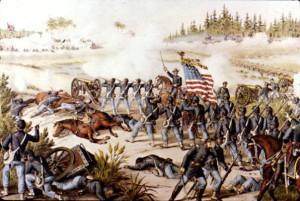
In 1783, when the United States’ independence was officially recognized by Great Britain, the American people set about the task of building a new government. The process was long and, at times, arduous. In 1789, a new Constitution was ratified and the United States, as we know it, became a reality. The period of initial nation-building, from 1783 to 1789 was a critical period in both American history and world history. For the first time since the reign of Julius Caesar, a republic stood on the face of the earth. Furthermore, a democratic republic had been established. It was a revolutionary development. The Founding Fathers recognized this reality. They were very purposeful in their mission and actions. When asked what government would guide the new country, Ben Franklin replied, “A republic…if you can keep it.”
From 1789 onward, the great crux of American history has been “keeping the republic”. This was especially true in 1861, when the Southern states seceded, leaving the republic bereft of Union and thus political life. Many issues contributed to the “glorious tragedy” that America experienced between 1861 and 1865 but one of the silent causes of the Civil War was the very survival of republicanism.
Men in the North may not have left their homes to fight for the survival of republican government, but the Union war effort carried the burden of proving to a watching world that republics were not doomed, as many in the Old World supposed. In aristocratic Britain, it was declared that the Civil War had put republicanism “on trial”. The Civil War was the test of republics. Could they survive? Could a “government of the people, by the people, for the people” stand the test of time and civil strife? Abraham Lincoln himself recognized that republicanism was hanging in the balance. He declared at Gettysburg that “We are now engaged in a great Civil War, testing whether that nation [America] or any nation so conceived and so dedicated [a republic] can long endure.” Undoubtedly there was more on the line than union or disunion. The very values that America was founded on were at stake. The Civil War was nothing short of the crucible of democratic republicanism.
As we all know, the Unionists prevailed, the republic was “kept” and republicanism did more than survive, it thrived. It spread from continent to continent in what Lincoln aptly called “a new birth of freedom”. The republican form of government had stood solid under the stress of its greatest test. The resolute republic of 1865 was evidence that American ideals would not be stillborn.
